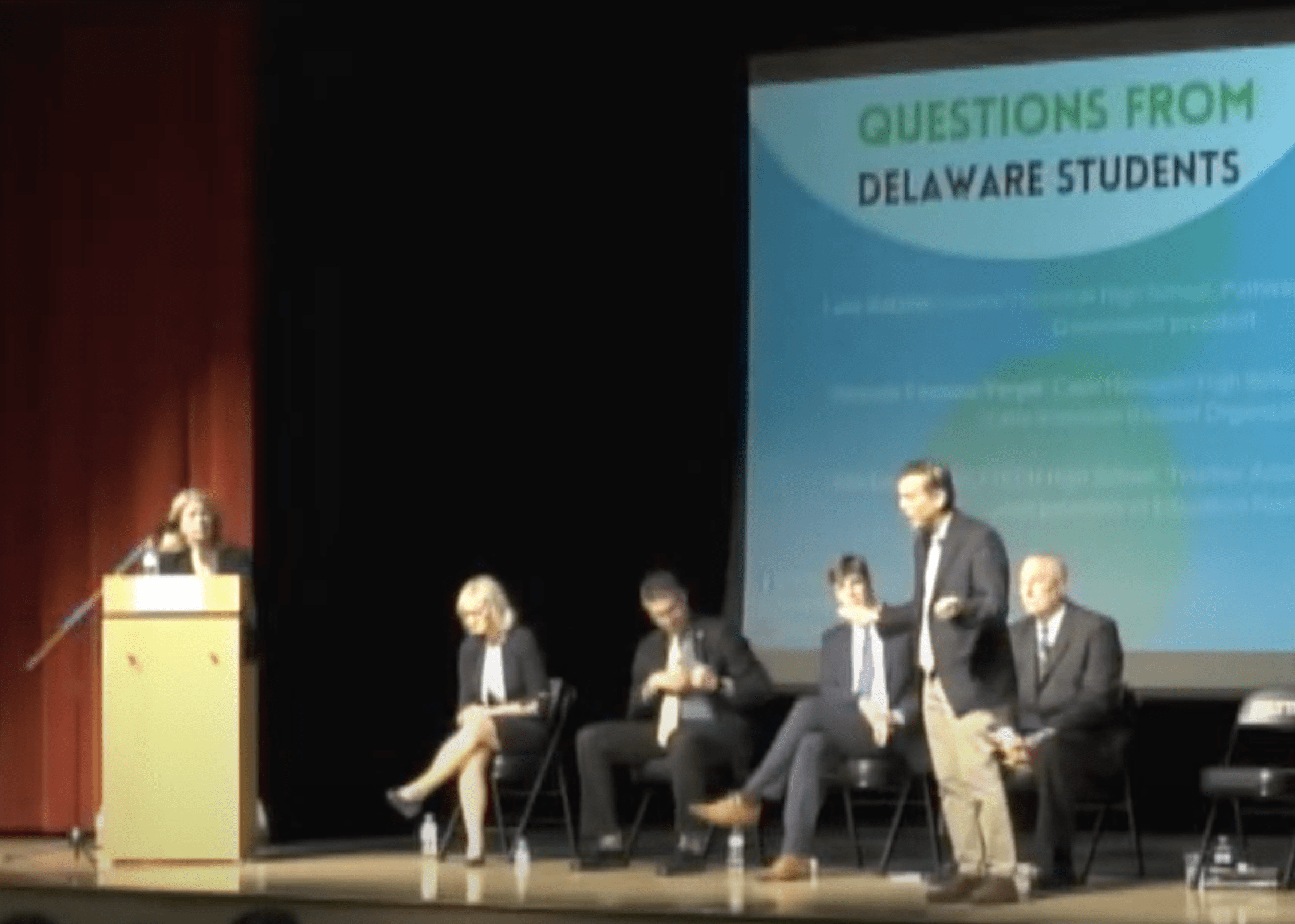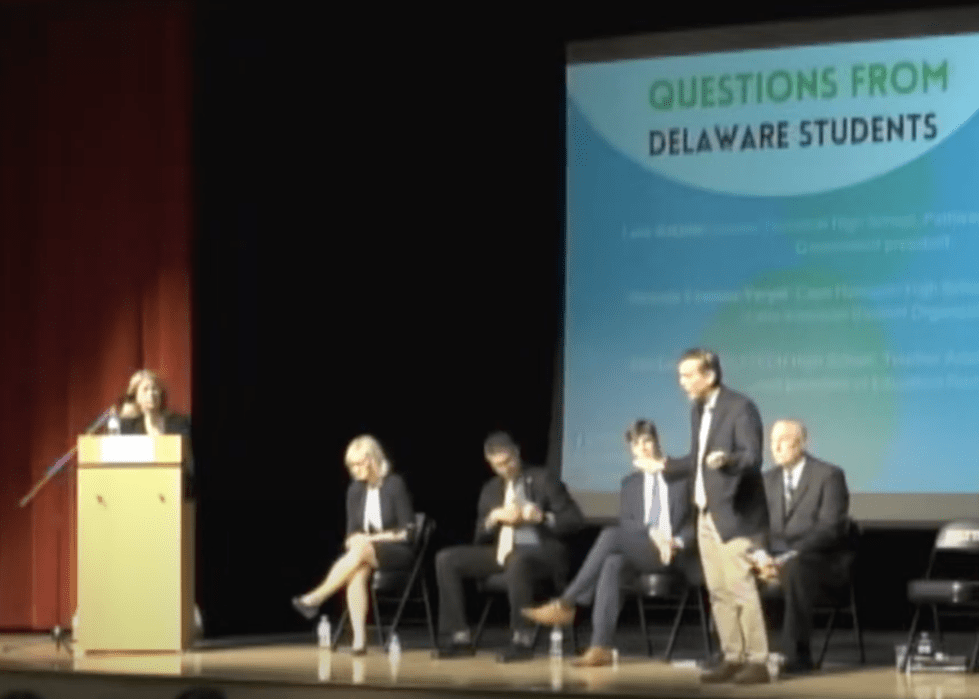

All five registered candidates for governor in November’s election gave their thoughts on education issues in a public forum Wednesday night.
The five candidates vying to replace Gov. John Carney in November’s gubernatorial election took the stage Wednesday night to give their thoughts on the state of education in Delaware.
The three Democrats and two Republicans agreed that the need for reform in First State schools transcends politics.
The forum, hosted by Polytech High School, was organized by the Vision Coalition of Delaware, a public-private partnership of Delawareans working to improve public education.
It includes education, community and legislative leaders, and it developed the Vision 2015 plan in 2006. Ten years later, with Delaware adopting more than 75 percent of its recommendations, Vision Coalition helped create a new 10-year plan.
Bettina Tweardy Riveros, chair of the Vision Coalition’s leadership team, asked the questions to the five candidates:
- Republican Mike Ramone, state representative
- Democrat Matt Meyer, executive of New Castle County
- Democrat Bethany Hall-Long, lieutenant governor
- Democrat Collin O’Mara, chief executive officer of the National Wildlife Federation
- Republican Jerry Price, former NYPD and Rehoboth Beach police officer
The typical questions were thrown their way on topics like low student achievement, reform to the funding formula, mental health in schools, equity for minorities and disadvantaged students, and more questions – some from Riveros and a few from students.
Along with the theme of bipartisanship sprinkled throughout the speakers, all of them agreed that there is a real problem in Delaware schools.
They all stressed the importance of providing a great education in a safe learning environment while supporting students and staff academically and mentally.
They all agreed that there needs to be tweaks to how the state allocates funds to schools.
They all agreed that investment in education needs to start at a young age.
Here’s more from the candidates:
Michael Ramone
Ramone told the audience about his friend Karen, someone who grew up in his neighborhood as his best friend.
He spoke on her developmental delay, saying that “I didn’t understand why Karen yard had a fence in her yard but I didn’t, but when I was six and seven and eight, and Karen was 11 and 12 and 13, Karen was still four and five in our play world.”
He said in society at that time, the way people treated Karen was terrible, ostracizing her from society.
His story is an example of why paying attention to mental health and providing resources for interventions is important.
On the topic of resources of multi-language learners, Malone said his pop pop came over on a boat from Italy, and his nine children, including Malone’s mother, were forbidden from speaking Italian in the house.
“He couldn’t talk to them and they couldn’t talk to him, but that was the rule,” Malone said.
He segued into opening schools like Las Americas Aspira Academy, a majority enrollment of Spanish-speaking students.
RELATED: ASPIRA shows off new high school serving Latino students
“What they’ve done there is stunning, but they took a community and the community now has a bilingual dynamic to it,” Ramone said. “They have children in there that are learning phenomenal Spanish, Spanish-speaking children but they’re learning English fluently, and it’s also brought their parents in to go full circle. That’s a solution to a very good problem and a very good question.”
He said it’s important the state gets a good bang for its buck when investing into schools.
“We are failing,” he said. “What we do is we print more dollars and then we put another bandaid on education… we need to tear the band aids off and look that the patient is septic, and they’re dying.”
He also explained his support for pathway programs and education that trains students in a specific field.
Businesses need workers or they will never come to Delaware, he said.
He said teachers must be paid adequately and supported – that creates a positive school climate where teachers and students are both motivated to perform well.
Matt Meyer
Meyer told a story about his time as a teacher, and how if a student didn’t do their homework one night, they lost recess and had to sit with him to do some extra work.
If a student missed homework a second night, Meyer would call the parent. ‘
And if they didn’t do homework a third night, Meyer would follow them home to talk to their parents.
He said one day, he had to go to the home of a student named David.
By the time Meyer was done telling David’s mom that he’s her son’s teacher, she had a tear rolling down her face.
“She told me that two weeks before school was starting, David was on the front lawn when he saw his sister shot dead,” Meyer said. “Kids are coming to school with baggage that we cannot see.”
He praised in-school wellness centers, which have been popping up in recent years as schools and districts contract with local healthcare providers to bring specialists into the school building.
Reducing class size and improving conflict resolution can help improve the mental health of teachers, he said, which can’t be overlooked.
He called educational equity a moral imperative that Delaware is failing, specifically in the city of Wilmington and rural areas.
“It starts with funding and getting the funding formula right,” he said.
A landmark funding report released in Dec. 2023 showed that Delaware needs to invest much more money into schools and the specific needs of students, especially with Black and Brown students, students with disabilities and multi-language learners.
RELATED: Adding $500M+ more into education likely matter for legislature
Meyer said students who are learning English should not be thought of as a problem, but rather as an opportunity.
“Our schools ultimately are a reflection of who we are as a community, as a society what our character is, and they should be shining lights for who we are as Delawareans,” he said.
He also said problems that might be a root cause of behavioral or social challenges for students need to be addressed at a young age, rather than waiting until they’re in high school and those problems could carry with them when not addressed.
He also said the referendum process is flawed and school districts should be able to raise local revenue with a hike in local taxes without going to referendum.
“If a family in Delaware makes $70,000, do you know they pay the same tax rate as someone making $70 million a year?” Meyer said. “There aren’t many states in the country where you can say that, that’s not right.”
He again said it’s a moral imperative we fix the problems in schools which have a huge effect on the community.
Bethany Hall-Long
Hall-Long said the state has done more than ever to make sure schools have the support to ingrain positive social and emotional health into students.
Many students have deep-rooted trauma, which has been exacerbated by the pandemic, and school staff must be informed of that while also providing help.
As governor, Hall-Long said she will lead the state to become the number one place teachers want to work in America.
The state needs to continue its efforts to make early childhood care affordable and accessible, she said.
She applauded education groups like Rodel and the Vision Coalition frequently publishing reports on the state of schools, saying that what the public really wants and values is transparency.
While citing the funding report and saying that the amount of money in public education isn’t enough, Hall-Long said regardless of the money in the pot, those dollars need to go to the right places, and they aren’t right now.
Attention to preparing students in high-need jobs is crucial, and Hall-Long added that she’d like to see more women pursue STEM careers.
Like Meyer, she hopes to build and expand on pathway programs.
“We have got to fix the broken funding formula, and we’re going to do that in a mechanism using the skills that I have had in the legislature for over 20 years,” she said. “We’re going to have to move that funding formula forward for equity.”
Hall-Long also wants to build more partnerships with social services organizations to help support students and their families.
Collin O’Mara
O’Mara called the funding formula, which is one of the oldest in the nation dating back 80 years, “the most inequitable funding formula in the county.”
Students are negatively affected across the state, not just one area, he said, by the failures of the formula.
He said schools should provide free breakfast and lunch, and compared how other states have a much larger number of students enrolled in pre-K, a prime exhibit of the lack of early childcare options in Delaware.
“I was told the other day that I’d be the first governor in 50 years to actually have kids in traditional public schools while serving as governor,” he said. “I’m a firm believer that stronger working conditions for teachers means stronger learning conditions for kids, if we support our educators and listen to their expertise and have them leading these conversations, not just reacting to them, we’re going to all be better off.”
His daughter is raised in a multi-language household, said O’Mara, whose wife is from Sri Lanka, so there’s constantly Tamil spoken inside the house.
He cited the funding report that showed that most other states have 30%-40% more funding for multi-language learners than Delaware.
He pointed out that the conversation is often focused on Spanish-speaking students, but there’s a myriad of other languages spoken from Delaware students like Haitian Creole, Farsi, a wide array of Asian dialects and more.
Connecting students through religious institutions, cultural clubs or other methods, he said, is a good way to ensure a harmonious school environment.
Having more responsibilities tossed onto teachers’ shoulders from the top-down prohibits teachers – those with the expertise – to actually govern their own classrooms, O’Mara said.
He said while pumping the $500 million minimum into education like the December report from the American Institutes for Research suggests isn’t cheap, it will yield a terrific return on investment.
He agreed that the referendum process is broken, especially since some, more affluent areas have an easier job of raising local revenue than poorer districts.
And when a district loses a referendum, he said, it compiles and makes it harder and harder to raise the needed funds in the future, which will likely be a greater amount needed as time goes on.
“If we invest here, we will have a strong state if we have strong schools,” he said. “If we don’t have strong schools, we can never have a strong state.”
Jerry Price
Price opened his appearance Wednesday night by saying that it’s important students have options, regardless of if college is in their future or not.
“You want to be a doctor or a nurse, we should put you in a hospital in the emergency room, you help them out, you’re going to learn to see if that’s what you want to do,” he said. “Want to be an auto mechanic? Great, I’ll put you in a body shop and you can learn to trade any traits, whatever it is, we can do that, and it will save the state over $3 million in the budget because the state doesn’t have to do that much.”
He said he’s spoken with several businesses and they’re all for partnering with students to bring them in and teach them a trade, without more government regulation.
He spoke fondly of his long time as a police officer and how it’s important to have students disciplined for bad behavior.
“Some schools have got some badasses, let’s be realistic,” he said. “What I want to give them the option to do, and this is not forced, I already talked to karate studios, boxing studios, and you learn that you’re not the toughest guy on the street, and you get disciplined.”
He said he guarantees as governor he will not step around the subject of school discipline.
Price believes poor mental health stems from a broken family structure.
“We’re going to provide counseling, it’s already there, and we can have outside counseling and maybe we can recommend you to somebody that wants to get help,” he said. “You can’t force people to get help if they don’t want it.”
Going to school with a clear mind will help students get a better education, he said.
He said all students should be treated the same and given the same resources.
When asked about how he would address the issue of underserved students, specifically multi-language learners, he said “The same, I would offer anybody else the same resources, same counseling, the same people coming in, opportunities are there and people have to take advantage of it. Treat everybody the same.”
He said he’s giving direct answers, not dancing around subjects and isn’t polished like the other four candidates on stage.
He loves teachers, and said they need to get idolized and appreciated and more teachers will come to Delaware to work.
“Everybody has a favorite teacher, and if you want to follow up like that teacher, do it, it’s great,” he said. “It helps out the community and helps out schools, and the state has a lot of opportunities for teachers.”
He agreed that students should get free meals and have a clear mind while learning, and said teachers have a large role in a child’s development.
Even though the funding report recommended $500 million to $1 billion more invested into public schools, Price says to pump the breaks.
“We need to go through the finances, we’ve got to see if that money is available,” he said. “I can’t just promise you I’m going to throw out $600 million and $2 billion when the money’s not there. That’s just somebody telling you to ‘Vote for me, I could do everything,’ but that’s not true.”
But, he said, property assessments should be done more frequently to establish the proper taxes homeowners should be paying to go towards schools.
“We have got to get more resources for these teachers so they’re not spending 24 hours a day doing this,” he said. “They have to be home for their families too.”
Watch the entire gubernatorial forum on education here:


Raised in Doylestown, Pennsylvania, Jarek earned a B.A. in journalism and a B.A. in political science from Temple University in 2021. After running CNN’s Michael Smerconish’s YouTube channel, Jarek became a reporter for the Bucks County Herald before joining Delaware LIVE News.
Jarek can be reached by email at [email protected] or by phone at (215) 450-9982. Follow him on Twitter @jarekrutz and on LinkedIn
Share this Post













